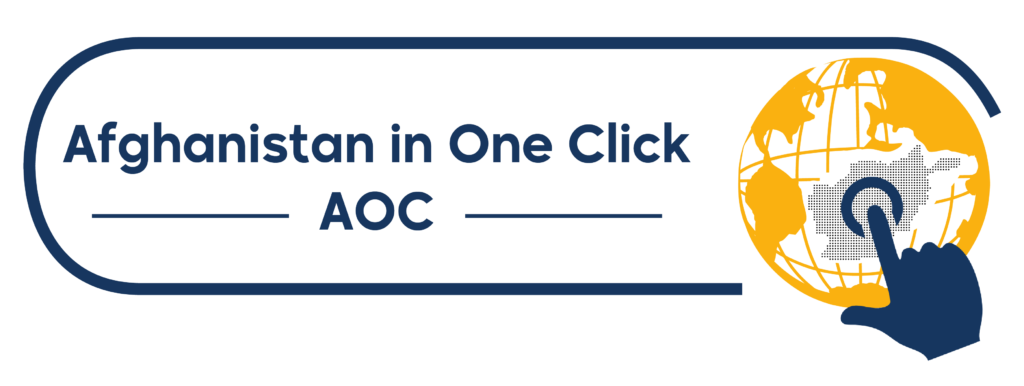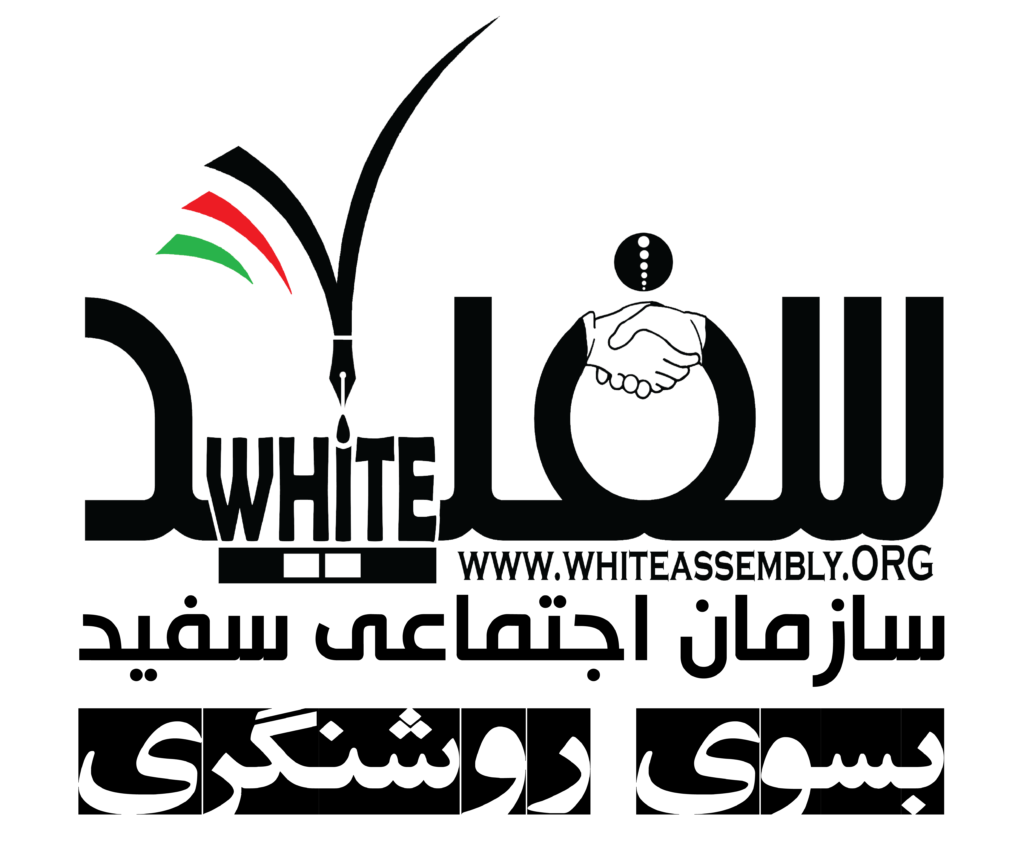Uzbekistan Embassy Commemorates Historical Emirs in Kabul
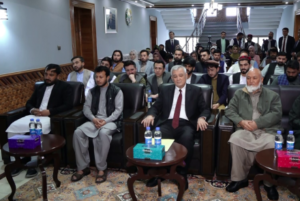 The Embassy of Uzbekistan in Kabul organized a cultural program in memory of Amir Timur Kurgan, Amir Ali-Shir Nava’i, and Zahiruddin Muhammad Babur in the capital.
The Embassy of Uzbekistan in Kabul organized a cultural program in memory of Amir Timur Kurgan, Amir Ali-Shir Nava’i, and Zahiruddin Muhammad Babur in the capital.
Yadgar Shadmanov, the ambassador of Uzbekistan, said that these historical figures have left a legacy in various sectors for today’s and future generations.
Uzbekistan’s Ambassador to Kabul said: “These three figures, namely Amir Timur, Ali Shir Nava’i, and Zahiruddin Muhammad Babur, are known in the world of science and culture by everyone because they have left lasting legacies with their pen and creations, and also in the sector of governance.”
A number of cultural figures said the holding of such programs are a way to further recognize the impactful roles of historical figures.
“Holding such gatherings helps especially the Uzbeks living inside Afghanistan to become aware of their identity and culture, and it is very influential,” said Mahboobullah Toran, a cultural activist.
“From the works of our ancestors like Amir Ali Shir Nava’i and Amir Saheb Qur’an, each of them had brilliant records in their eras,” said Inamullah Frotan, another cultural activist.
In this program, a number of youth who had roles in cultural activities and also created literary works were honored by the Embassy of Uzbekistan.
The annual report of the US Department of State: The Taliban have removed women from the public sphere
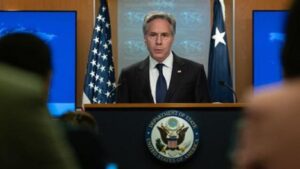 The US State Department has published its new annual report on the state of human rights in the countries, in which the Taliban government is severely criticized for the widespread violation of human rights in Afghanistan, including the continued restrictions on women and ethnic and religious minorities.
The US State Department has published its new annual report on the state of human rights in the countries, in which the Taliban government is severely criticized for the widespread violation of human rights in Afghanistan, including the continued restrictions on women and ethnic and religious minorities.
In this report, it is also mentioned that the policy of arresting, killing, prosecuting and detaining political opponents by the Taliban is continued.
In the report of the US Ministry of Foreign Affairs, referring to these cases and also due to the lack of flexibility of the Taliban group, it is stated that the US has no decision to recognize the Taliban group.
Zabihullah Mujahid, the chief spokesman of the Taliban group, responded to this report and said that “the people of Afghanistan are all Muslims and their rights are defined and provided according to Islamic Sharia”.
The report states that arbitrary arrests, torture, killing people, banning education and restricting the work of Afghan women have “caused the deterioration of the human rights situation and the confinement of women within the four walls of their homes.”
US Secretary of State Anthony Blinken told reporters that they prepared this report in cooperation with international institutions and organizations.
When presenting this report, he said: “The Taliban have practically removed women from the public sphere with their decrees, and the situation of women in Afghanistan has worsened. The Taliban have restricted employment opportunities for women and closed down girls’ educational institutions, as well as increasing public flogging of accused men and women.
However, Mr. Mujahid said in a conversation with Afghanistan’s state television: “In America and other western countries, the definition of culture and human rights is different from our interpretation in Afghanistan, and westerners should not impose their culture on other countries
US State Dept: No Plans to Recognize the Taliban Group
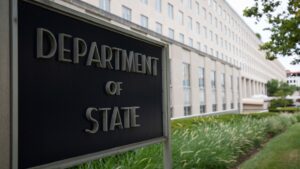 The US Department of State in its annual report published on April 22 stated that Washington has no plans to recognize the “Taliban” in Afghanistan.
The US Department of State in its annual report published on April 22 stated that Washington has no plans to recognize the “Taliban” in Afghanistan.
In this report, which addresses the state of human rights globally in 2023, the US Department of State also mentioned that the “Taliban” have neither reversed nor softened their decrees regarding work and education for women in Afghanistan.
The report claims that over 90% of the prisoners under the rule of the caretaker government in Afghanistan are political prisoners and criticized issues such as arrests, torture, restrictions on media, and freedoms of movement.
“No decree or directive pertaining to women and girls’ education, or work, was reversed or softened. The Taliban group did not purport to formally change existing laws as legislated by the Republic-era government; however, they promulgated edicts that contradicted those laws and were inconsistent with Afghanistan’s obligations under international conventions,” the report reads.
U.S. Secretary of State Antony Blinken said: “In Afghanistan, the Taliban have limited work opportunities for women, shuttered institutions found educating girls, and increasing floggings for women and men accused of, quote, “immoral behavior.”
The report criticized issues such as extrajudicial killings, torture and degradation of individuals, procedures of detention, treatment of prisoners including political prisoners, confiscation of individual properties, freedom of speech and media, restrictions on internet usage, and restrictions on individuals’ participation in political processes and parties.
The de facto government called the claims in the annual report of the US State Department regarding the situation in Afghanistan, baseless.
Hamdullah Fitrat, deputy spokesman for the de facto government, told XXX: “The caretaker government of Afghanistan as the governing power, is committed to Islamic and Sharia rights for all its citizens. The Western world desires the implementation of Western equivalent rights and essentially strives to impose Western culture.”
Waheed Faqiri, a political analyst, said: “This report was indeed shocking and I think it confirms all the past occurrences, and I believe that America will not recognize the Taliban during the election campaigns that continue until the end of this year.’
Nearly three years after the return of the de facto government in Afghanistan, no country, including neighboring countries, has recognized the Taliban group.
Russian Def Min: Central Asia Threatened by Terrorists 'In Afghanistan'
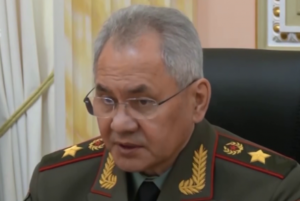 At the Shanghai Cooperation Organization’s defense ministers’ meeting in Kazakhstan, Russian Defense Minister Sergei Shoigu claimed that the main threat to Central Asia originates from terrorists based in Afghanistan.
At the Shanghai Cooperation Organization’s defense ministers’ meeting in Kazakhstan, Russian Defense Minister Sergei Shoigu claimed that the main threat to Central Asia originates from terrorists based in Afghanistan.
The Russian Defense Minister also spoke at the meeting about America’s efforts to regain influence in the region following its withdrawal from Afghanistan.
Sergei Shoigu said, “The main danger to Central Asia comes from extremist terrorist groups based in Afghanistan, and the United States is trying to influence the region after its 2021 withdrawal from Afghanistan.”
The de facto government has repeatedly stated that Afghan soil will not be used against any country.
Some military experts believe that there are no terrorist groups in Afghanistan.
Abdul Hadi Quraishi, a military affairs expert, told TOLO news: “Russia and China should be assured that there is no threat from Afghan soil against Central Asia and the member countries of the Shanghai Cooperation Organization, and it is the policy of the caretaker government that Afghan soil does not pose a threat to any country in the world and will not do so.”
Hekmatullah Hekmat, a military affairs expert, said: “Afghan soil is currently not hosting any terrorist groups, and it is the hope of the current government’s officials to maintain their neutrality in such interactions and consider national interests.”
The de facto government has consistently called the claims of terrorist groups’ presence in Afghanistan unfounded.
Peaceful Afghanistan 'Imperative' for Region: Pakistan Officials
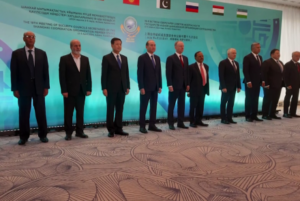 The secretary of the National Security Division of Pakistan, at the end of the two-day Shanghai Cooperation Organization (SCO) meeting, stated that a peaceful and stable Afghanistan is a strategic necessity for the prosperity of the region.
The secretary of the National Security Division of Pakistan, at the end of the two-day Shanghai Cooperation Organization (SCO) meeting, stated that a peaceful and stable Afghanistan is a strategic necessity for the prosperity of the region.
The Ministry of Foreign Affairs of Pakistan, quoting Waqar Ahmed, the security of the National Security Division, wrote that he has asked the SCO members to support a comprehensive and broad policy to address multifaceted challenges confronting Afghanistan.
“He termed peaceful and stable Afghanistan a strategic imperative for regional prosperity and called upon all SCO member States to follow a holistic policy and build on broad convergences with the SCO region to address multifaceted challenges confronting Afghanistan,” said Mumtaz Zahra Baloch, the spokesperson for Pakistan’s Ministry of Foreign Affairs
In the final statement of the 19th meeting of the Shanghai Cooperation Organization, concern was again expressed about the presence of terrorist groups in Afghanistan.
The statement requested the de facto government to fulfill its commitments in combating terrorism, especially in suppressing other groups that threaten the members of this organization.
“It is necessary to engage with countries based on mutual interests and in upholding the rights of the Afghan people from various factions and classes, the de facto government must commit itself in this regard,” said Abdul Naser, a military analyst.
“Some of our neighboring countries are malicious and do not want a strong central government in Afghanistan and always criticize, among them Pakistan and Tajikistan, no other country has criticized,” said Kamran Aman, another military analyst.
China, India, Russia, Pakistan, Kazakhstan, Kyrgyzstan, Tajikistan, Iran, and Uzbekistan are members of the Shanghai Cooperation Organization.
De facto government Committed to Counterterrorism in Afghanistan
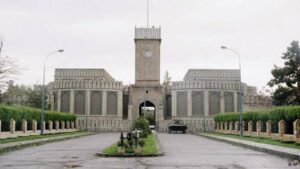 The de facto government considers the concern of some countries at the meeting of the National Security Advisors of the Shanghai Cooperation Organization to be misplaced.
The de facto government considers the concern of some countries at the meeting of the National Security Advisors of the Shanghai Cooperation Organization to be misplaced.
The caretaker government denies the presence of terrorist groups in the country and adds that they have undertaken a serious fight against terrorist groups.
Hamdullah Fetrat, the deputy spokesperson for the de facto government, said, “Some countries claim that there are terrorist groups in Afghanistan and it is a threat, but the Islamic Emirate is committed to fighting terrorist groups and does not allow its territory to be used against any country.”
In the 19th meeting of the National Security Advisors of the Shanghai Cooperation Organization, some countries including India, Russia, and Kazakhstan expressed their concerns about the presence of terrorist groups and their threats from Afghanistan to the countries in the region.
The Russian news agency TASS, quoting the National Security Advisor of Russia, wrote that these countries have asked the Taliban to fulfill their commitments in the fight against terrorist groups.
“The heads of delegations called on the de facto authorities of Afghanistan to consistently fulfill their obligations in the field of counterterrorism, especially in preventing the activities of international terrorist organizations and other groups based on Afghan soil that pose a serious threat to the SCO space,” Nikolai Patrushev said.
Tariq Farhadi, an international relations expert, told XXX, “ISIS is a group that is an enemy to all, but thank God, the attackers in Moscow did not have any Afghan passports.”
According to some Indian media, at this meeting, the National Security Advisor of India also assured that focusing on establishing an inclusive government, preserving the rights of women and minorities are among the immediate priorities of this organization in Afghanistan.
Najib Rahman Shamal, an expert in international relations, said, “In the recent meeting of this organization, the issue of security threats from Afghanistan was discussed again, and the members of the Shanghai Cooperation Organization have asked Afghanistan to take necessary actions regarding the terrorist sanctuaries present in Afghanistan.”
The meeting, which was held for two days in Astana, the capital of Kazakhstan, ended on Thursday. Previously, the United States Department of State had also emphasized the fight of the caretaker government against terrorist groups, adding that their country must ensure that Afghanistan does not become a safe haven for terrorists.
Remembering the Fall of Afghanistan's First Republic
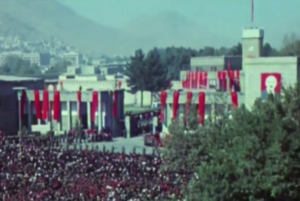 On Saur 7, 1357 (solar calendar), following a coup by the People’s Democratic Party, the first republic regime in Afghanistan was overthrown.
On Saur 7, 1357 (solar calendar), following a coup by the People’s Democratic Party, the first republic regime in Afghanistan was overthrown.
Friday marks the 46th anniversary of the day the People’s Democratic Party assassinated Mohammad Daoud Khan, who had established the country’s first republic, along with 18 members of his family at the presidential palace, effectively toppling the first republic regime in the country.
The morning of Saur 7, 1357, began with the alarming sounds of cannons and gunfire.
46 years ago today, tanks and helicopters from the army stormed the presidential palace from both ground and air, marking the first coup against the first republic regime.
Sultan Mahmoud Telayie, a relative of Sardar Mohammad Daoud Khan, said: “A president who was trying to keep Afghanistan together, wearing a helmet, along with all his family members, was attacked at the presidential palace by the regime of the People’s Party and communists trained by the Russians, and at nine o’clock in the morning of Saur 7, 1357, all his family members were martyred.”
The coup on Saur 7, 1357 is regarded as a significant event in Afghanistan’s history and marked the beginning of years of conflict and rebellion in the country.
After the assassination of Sardar Mohammad Daoud Khan, Noor Mohammad Taraki, one of the leaders of the People’s Democratic Party, seized power and initiated another major political shift in Afghanistan.
This rebellion in 1358 led to the entry of the Soviet Red Army into Afghanistan, resulting in a decade-long war between the Mujahideen and the Soviets.
Tariq Farhadi, a political analyst, told TOLOnews: “Saur 7, 1357 (solar calendar) changed the course of Afghanistan; the communist coup led to the entry of the Soviet Union into Afghanistan and subsequently brought America into the Afghan internal wars.”
During these conflicts, which lasted nearly ten years, approximately two thousand military and civilian individuals in the country lost their lives, and millions more were forced to flee the country.
On April 28, 1991, the Mujahideen came to power after the People’s Democratic Party of Afghanistan, led by Dr. Najibullah, collapsed.
Amid the deportation of Afghan refugees, Pakistan has extended their residence cards for another two months
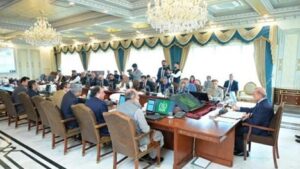 Amid a second round of deportations of refugees and unregistered migrants in Pakistan, the country’s government on Friday approved the extension of “Proof of Registration” or (POR) cards for Afghan refugees for another two months.
Amid a second round of deportations of refugees and unregistered migrants in Pakistan, the country’s government on Friday approved the extension of “Proof of Registration” or (POR) cards for Afghan refugees for another two months.
Pakistan’s Cabinet, headed by Prime Minister Shahbaz Sharif, said that refugees with these cards will have access to services such as schools and bank accounts by the end of June.
These cards have expired on April 1st and the government of Pakistan had previously refused to renew them.
The Pakistani government had previously said that in addition to undocumented asylum seekers, it would also begin the process of deporting Afghans registered in Pakistan.
According to the information of the United Nations High Commissioner for Refugees, out of about 2.2 million refugees in Pakistan, one million and 300,000 people have POR cards and the remaining 900,000 people have ACC cards.
Taliban Foreign Minister: Afghanistan's three neighboring countries support ISIS
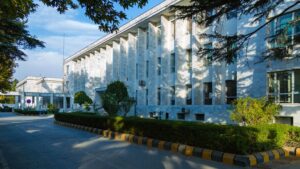 Amir Khan Motaghi, the foreign minister of the Taliban group, has accused the “three neighboring countries of Afghanistan” of supporting the group known as the Islamic State or Daesh, and at the same time has emphasized that Daesh is not present in Afghanistan.
Amir Khan Motaghi, the foreign minister of the Taliban group, has accused the “three neighboring countries of Afghanistan” of supporting the group known as the Islamic State or Daesh, and at the same time has emphasized that Daesh is not present in Afghanistan.
“Thank God, ISIS is not present in Afghanistan,” Mr. Motaghi said at the opening ceremony of the joint Afghanistan-Kazakhstan exhibition in Kabul – which was broadcast live on state television. Unfortunately, our three neighboring countries in turn (support ISIS). One provides manpower for ISIS. We saw that they made attacks in different places. “Another country is on the path through which people [militants] pass to disrupt security, while the other country provides them with bases, funding and planning centers.”
Without naming a specific country, he said: “If these three countries fulfill their responsibilities, there will be no problems in Afghanistan and the region.”
This is the first time that a de facto government official at such a high level openly accuses three neighboring countries of Afghanistan of collaborating with ISIS.
This Taliban group official also emphasized the need for joint cooperation in security issues and said: “Out of ten security incidents in Afghanistan in the past years, eight incidents were carried out by those who came from outside Afghanistan.” This shows that the people of Afghanistan are cooperating with the de facto government (Taliban group) in their ideology and beliefs. “They don’t want the destruction of their country, and they don’t want to harm others, and they have proven that.
Rainfall and deadly floods in Afghanistan; The number of dead increased to at least 50 people
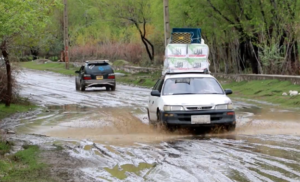 As a result of heavy rain and flooding in some provinces of Afghanistan in the last three days, at least 50 people have died and dozens of houses have been destroyed or damaged.
As a result of heavy rain and flooding in some provinces of Afghanistan in the last three days, at least 50 people have died and dozens of houses have been destroyed or damaged.
Most of the casualties and damages were related to the provinces of Kandahar and Zabul in the south and Herat and Farah in the west.
At the same time, the Afghanistan Meteorological Department has warned of more heavy rain in 29 provinces of Afghanistan.
The Afghanistan Meteorological Department said that the possibility of snowfall and heavy rain will be more in the eastern, northeastern and central provinces.
Afghanistan reaches self-sufficiency in production of 133 items: MoIC
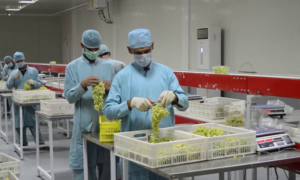 The Ministry of Industry and Commerce (MoIC) says Afghanistan has reached self-sufficiency in 45 sectors and the production of 133 items, and that the ministry is striving to change Afghanistan from an importing country to an exporting one.
The Ministry of Industry and Commerce (MoIC) says Afghanistan has reached self-sufficiency in 45 sectors and the production of 133 items, and that the ministry is striving to change Afghanistan from an importing country to an exporting one.
The ministry officials said that for this purpose, supporting domestic products and attracting investment is essential.
The ministry’s spokesman Abdul Salam Jawad Akhundzada emphasized increasing the use of domestic goods and products in government and national projects and added that efforts have also begun to find a market for domestic products inside and outside the country.
“We have reached self-sufficiency in 133 items of production, which is 45 sectors, and also we reached the capacity of semi-self-sufficiency in 95 items of production, which is 27 sectors,” he said.
Meanwhile, the Chamber of Industries and Mines (ACIM) says over the past two and a half years, more attention has been paid to the development of domestic production and it is also expanding.
The chamber officials stressed expanding the culture of using domestic products in government projects.
“I think that the government is one of the biggest consumers in the market if it uses domestic products in all its development projects,” said Abdul Nasir Rashtia, a member of ACIM.
Economic experts also said that if the use of domestic products in government projects increases, Afghanistan will quickly move towards economic independence.
DAB declares online currency exchanges illegal
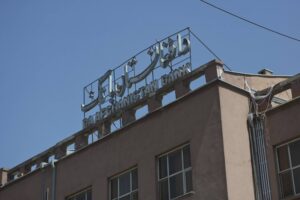
Da Afghanistan Bank (DAB) announced Monday that online exchanges are banned and legal action will be taken against anyone who violates the order.
DAB said in an announcement that it has not issued any license to any person or company to operate an online exchange, because such activities are illegal.
“Da Afghanistan Bank requests our dear compatriots to refrain from online exchange transactions due to the risks, damages and subsequent consequences of these transactions,” it said.
DAB added that the issue has been shared with intelligence and security institutions and legal action will be taken against violators.
Afghanistan-Kazakhstan chamber of commerce opens in Herat
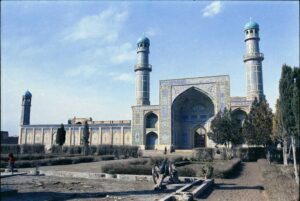 The Ministry of Interior said the governor of Herat province Islam Jar met with Alim Khan Yasin Gildaye, Ambassador of Kazakhstan to Afghanistan, to discuss various issues around trade.
The Ministry of Interior said the governor of Herat province Islam Jar met with Alim Khan Yasin Gildaye, Ambassador of Kazakhstan to Afghanistan, to discuss various issues around trade.
According to the ministry, the two sides discussed the expansion of trade facilities, increasing the volume of trade exchanges between traders of the two countries, reducing customs tariffs, solving the challenges of traders and issuing visas to them.
The Afghanistan-Kazakhstan Chamber of Commerce has been opened in Herat in order to facilitate and increase trade between the two countries.
Majority of exports, imports being carried out via Iran’s Chabahar Port: MoIC
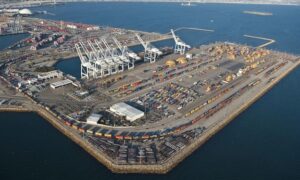 Ministry of Industry and Commerce (MoIC) officials say they are looking for new transit routes in order to remove current import and export.
Ministry of Industry and Commerce (MoIC) officials say they are looking for new transit routes in order to remove current import and export.
The ministry’s spokesman Abdul Salam Jawad Akhundzada said most of the country’s exports and imports are currently carried out through Iran’s Chabahar Port.
“The policy we have is economy-oriented. We established trade relations with different countries and were able to find alternative ways for our trade,” said Jawad Akhundzada.
The Chamber of Commerce and Investment (ACCI) also said that a large percentage of goods are being exported and imported through Iranian ports.
ACCI added that it wants to reduce exports and imports from Pakistan.
This chamber has asked traders to import and export goods through ports that have more facilities.
Turkey’s 77 keen to start up cement plant in Jawzjan
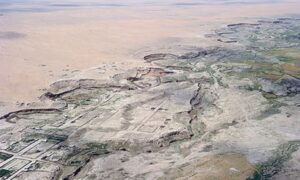 Turkish construction company 77 officials have met with the acting minister of mines and petroleum, Shahabuddin Delawar, about investing in a cement factory in Yatim Taq area of Jawzjan province.
Turkish construction company 77 officials have met with the acting minister of mines and petroleum, Shahabuddin Delawar, about investing in a cement factory in Yatim Taq area of Jawzjan province.
The minister, Shahabuddin Dalawar, has said the ministry will cooperate with the company but first needs a proposal, including details around how they plan to implement the project as well as social development plans.
Turkey’s 77 company has been working on electricity generation projects in Afghanistan for several years.
A number of industrialists say that if more investment is made in the cement production sector, not only will domestic demand be met, but the country’s cement will also be exported.
At the moment, cement is being produced by private companies in the provinces of Kandahar, Parwan and Herat.
Over 7% Decline in Pakistan's Exports to Afghanistan in Eight Months
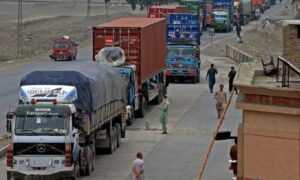 The State Bank of Pakistan has reported that Pakistan’s exports to Afghanistan have decreased by more than seven percent in the past eight months.
The State Bank of Pakistan has reported that Pakistan’s exports to Afghanistan have decreased by more than seven percent in the past eight months.
Pakistani media, citing the State Bank, have reported that during this period, the country’s imports from Afghanistan also decreased by 59 percent.
According to a report in Pakistan’s national newspaper, China ranks first among Pakistan’s neighboring countries in terms of exports, with other countries like Bangladesh and Afghanistan ranked second and third, respectively.
The report states: “Exports to Afghanistan decreased from $346 million to $319 million, and imports dropped from $13.54 million to $5.44 million.”
Maiwand Hotak, head of the Chamber of Commerce and Investment, said, “The ports and passages that we have with Pakistan are all of great importance to us, and we must strive to solve any arising problems as soon as possible.”
Meanwhile, the Afghan Ministry of Industry and Commerce also speaks of a 24 percent decrease in the country’s exports to Pakistan and a 30 percent increase in imports from this country over the past year.
Akhandzada Abdul Salam Javad, the spokesperson for the Ministry of Industry and Commerce, said, “During the year 1402, trade between Afghanistan and Pakistan was about $2.443 billion, of which $926 million was exports and $1.517 billion was imports.”
In the meantime, the Afghanistan-Pakistan Joint Chamber of Commerce has requested Islamabad to extend the Karachi railway to Peshawar to facilitate and reduce the cost of goods transfer between the two countries.
Naqibullah Safi, head of the Afghanistan-Pakistan Joint Chamber of Commerce, says that with the launch of this railway, the cost of transporting goods will decrease, and traders of both countries will be saved from paying exorbitant fees.
Safi added, “The Afghanistan-Pakistan Joint Chamber of Commerce wants permission in Karachi for Afghan transit goods to be transferred to other containers and transported via rail to Torkham.”
This comes at a time when border tensions between Afghanistan and Pakistan and the forced deportation of Afghan migrants from Pakistan are cited as the main reasons for the decline in trade between these two countries over the past year.
Afghanistan Reports Increase in Trade Activities in Hoot 1402
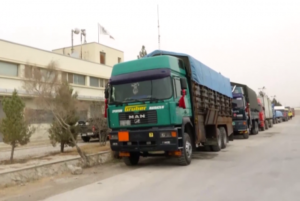 In the final month of the last solar year, Afghanistan conducted exports worth $141.1 million and imports totaling $789.6 million.
In the final month of the last solar year, Afghanistan conducted exports worth $141.1 million and imports totaling $789.6 million.
According to the National Statistics and Information Authority (NSIA), the largest exports were to Pakistan, India, and the United Arab Emirates.
The agency adds that the country’s exports have increased by $32.9 million compared to the same period in the year 1401 solar.
Mohammad Halim Rafi, the spokesperson for the NSIA, stated, “Our data shows that in the month of Hoot in 1402, total exports amounted to $141.1 million and similarly, total imports in this month were $789.6 million, with the most exports going to Pakistan, India, and the UAE, and imports coming from China, Pakistan, and Iran.”
Meanwhile, the Afghanistan Chamber of Commerce and Investment reports that the country’s export items are primarily composed of Afghan minerals. Officials in the chamber add that due to the lack of large refining facilities in the country, extracted minerals are exported raw.
Khan Jan Alokozay, a member of the board of directors of the Afghanistan Chamber of Commerce and Investment, said, “Most minerals in Afghanistan are not processed; hundreds of types of talc materials are found, which are used in cosmetics and medicine, but we just grind this and send it to China and Pakistan.”
However, some economic experts emphasize focusing more on exports, suggesting that increasing exports will bring more money into the country.
Mohammad Nabi Afghan, an economic expert, said, “Our neighboring countries have set up their factories and they are striving to maintain this. If we now produce something in Afghanistan, the local market is very small, and if we do not have a foreign market, we cannot compete here.”
Abdul Zuhur Mudabir, an economic expert, said, “Exports and imports are major components that can elevate a nation’s national revenue. Accordingly, the more a country has a surplus in exports over imports, the more it can be driven towards prosperity.”
According to data from the Ministry of Industry and Commerce, Afghanistan had exports worth $1.9 billion in the year 2023.
This figure shows a two percent increase despite the repair of the Salang Pass, a decrease in coal exports, and issues in neighboring countries, amounting to an increase of $41 million.
Major Afghanistan-Kazakhstan Exhibition to Be Held in Kabul
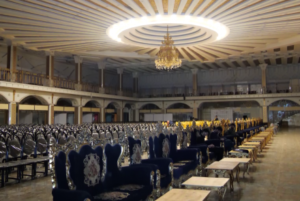 The Ministry of Industry and Commerce has announced that a large exhibition, with the participation of Kazakh and Afghan traders, will be held in Kabul on Thursday, April 25.
The Ministry of Industry and Commerce has announced that a large exhibition, with the participation of Kazakh and Afghan traders, will be held in Kabul on Thursday, April 25.
Akhundzada Abdul Salam Jawad, spokesman for the Ministry of Industry and Commerce, stated that this exhibition will be launched as a continuation of the joint Afghan-Kazakh exhibition held in July 2023.
“This exhibition is a continuation of the Kazakh-Afghan International Exhibition, which was held in July last year with the participation of a large and mixed delegation from the government and private sectors of the caretaker government of Afghanistan. Afghan and Kazakh products and productions in various sectors will be showcased for two days in this exhibition,” he told TOLOnews.
Individuals who are participating told XXX that various sectors in the exhibition are striving to attract the attention of Kazakhstani traders to their production.
Khalimullah Saraj, a merchant, said: “The exhibition is aimed at introducing the products of a country, and our goal is to have more contracts and exports to Kazakhstan.”
Meanwhile, officials of the Afghanistan International Exhibition have stated that in addition to showcasing the country’s products, booths have also been prepared for forty Kazakhstani traders and industrialists.
According to the statistics of the Afghanistan International Exhibition Center, nearly ten joint exhibitions of Afghan products with countries such as Qatar, Oman, Iran, Turkey, Kazakhstan, Turkmenistan, and Kabul have been held in the past year, and in the near future, more joint exhibitions will be held in Uzbekistan and Iran.
IOM Makes Efforts for Women's Economic Empowerment in Afghanistan
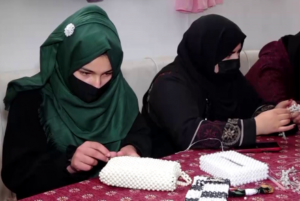 The International Organization of Migration (IOM) reported that in less than four months, it has created over 2,200 job opportunities in Afghanistan, including 1,103 specifically for women.
The International Organization of Migration (IOM) reported that in less than four months, it has created over 2,200 job opportunities in Afghanistan, including 1,103 specifically for women.
Several businesswomen call on aid organizations to support female entrepreneurs and businesswomen in the country.
Zahra Sadat Hossaini, who was previously employed at a government agency, has been unemployed since the re-establishment of the caretaker government in the country.
She says that over the past two years, she has created an agency to support women, directly and indirectly providing jobs and training opportunities for about 700 women in the handicraft sector.
Zahra Sadat told TOLOnews: “If there were no women, men could not progress today because women are half of the society’s body. If we utilize women’s power in society, we will have an advanced country.”
Some businesswomen say that financial support for them positively impacts the economic growth of their families.
Nadia Nayab, a businesswoman, said: “Women have turned limitations into opportunities and work in various fields in Afghanistan, which itself is a good opportunity for progress.”
Anisa Ahmadi, another businesswoman, said: “I work in the bridal gown production sector, which is a very good area, but there must be enough income and expense to be able to produce; the costs in the bridal gown sector are very high.”
Khanjan Alkozai, a board member of the Chamber of Commerce and Investment, said: “In our business, we had a number of women whose licenses had been suspended but are now active again, yet they are not at the level they were during the Republic.”
Previously, a United Nations Development Programme (UNDP) report stated that the agency, in collaboration with its partners, has supported 75,000 small businesses led by women in Afghanistan and created job opportunities for 900,000 individuals in total.
Afghanistan Sees 20% Increase in Dried Fruit Exports in 1402
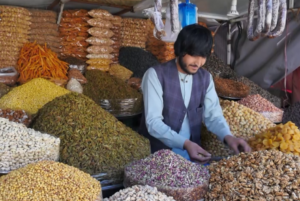 The Ministry of Industry and Commerce reported a 20% increase in the export of dried fruits in the year 1402 (solar year).
The Ministry of Industry and Commerce reported a 20% increase in the export of dried fruits in the year 1402 (solar year).
According to Akhundzada Abdul Salam Jawad, the Commerce and Industry spokesman, last year dried fruits worth $466 million dollars were exported to India, China, Pakistan, Saudi Arabia, United Arab Emirates, Germany, and Turkey.
The Commerce and Industry spokesman, added: “The total export of Afghanistan’s dried fruits in the year 1402 has increased by about 20% compared to the year 1401, which amounts to about $78 million dollars.”
The Afghanistan Chamber of Commerce and Investment (ACCI) considered the increase in flights through the country’s air corridors as important in boosting the export of dried fruits.
ACCI spokesman Jan Agha Nawid, said: “Part of the air corridor should be financed by the government or supporting institutions of Afghanistan, and subsidies should be provided so that they can offer their items in the market and compete in those markets.”
A number of traders in the country mentioned banking restrictions, existing challenges in obtaining business visas, and transit and trade challenges at the country’s passageways as the main challenges to the export of dried fruits in 1402 (solar year).
“This year the government should reduce the bureaucracy in export programs and the documents that we need for export, which take at least two to three days to process, and we also face problems in customs to a sufficient extent,” said Mahboobullah Mohammadi, a trader.
According to the statistics of the Ministry of Industry and Commerce, in 1402 (solar year), exports worth $1.8 billion dollars were conducted outside the country.
Smuggling of Over 1,400 Antiquities Prevented: Officials
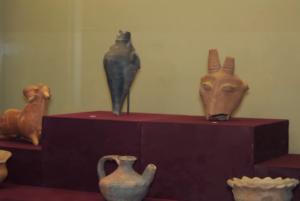 Most of these antiquities were recovered from the provinces of Kabul, Nangarhar, Baghlan, and Jowzjan.
Most of these antiquities were recovered from the provinces of Kabul, Nangarhar, Baghlan, and Jowzjan.
Officials at the Ministry of Information and Culture have stated that over the past two years, the ministry has prevented the smuggling of more than 1,400 antiquities out of the country.
Most of these antiquities were recovered from the provinces of Kabul, Nangarhar, Baghlan, and Jowzjan.
Khobaib Ghuffran, the spokesperson for the Ministry of Information and Culture, told TOLOnews: “Since the establishment of the Islamic Emirate, the Ministry of Information and Culture has been able to prevent the smuggling of 1,460 antiquities in collaboration with security and intelligence agencies, and just in the year 1402, we prevented the smuggling of 1,182 antiquities.”
According to officials at the Ministry of Information and Culture, the most commonly smuggled items include valuable coins, artifacts from the Kushan period, and Islamic artifacts, particularly from the Stone Age.
The spokesperson added: “The artifacts that are most targeted for smuggling are historical coins, meaning they are small items that can be transported easily. These include artifacts from the Kushan era, the Islamic periods, and even the ancient Stone Age.”
However, some cultural experts and archaeologists say that these ancient artifacts are part of the national heritage of the country, and the government should make greater efforts than ever to protect them.
Gul Rahman, a cultural affairs expert, told TOLOnews: “Antiquities are indicative of Afghanistan’s history. Afghanistan has a valuable history of five thousand years, and preserving and maintaining it is essential.”
Previously, the Deputy Minister of Publications at the Ministry of Information and Culture, during a ceremony commemorating International Day for the Protection of Cultural Heritage, mentioned that the leader of the Islamic Emirate had ordered measures to prevent the trafficking and sale of ancient and cultural artifacts in the country.
500 Artifacts Restored at National Museum in 1402
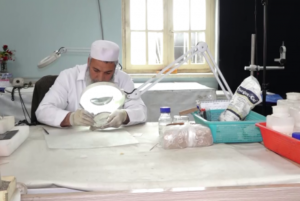 Officials at the National Museum of Afghanistan reported the restoration of five hundred historical and archaeological artifacts in the past year, noting that the restored items include sculptures, coins, and utensils from various periods.
Officials at the National Museum of Afghanistan reported the restoration of five hundred historical and archaeological artifacts in the past year, noting that the restored items include sculptures, coins, and utensils from various periods.
Mohammad Yahya Mohebzada, the deputy director of the National Museum, said: “Restoration and preservation is an everyday task for our colleagues. Last year, I mentioned that we should focus on the year 1402 (solar year), during which our colleagues managed to cover the restoration of five hundred historical and archaeological artifacts despite difficulties.”
Officials at the National Museum also expressed concerns about the scarcity of materials and equipment needed for the restoration of historical and archaeological artifacts in the country.
Islamuddin, an experienced restorer who has dedicated twenty years of his life to this profession, said that these restorations include various works, such as those from the Islamic period, made from different materials like stone and clay.
“We work in different sections, and currently, you see this is one of the artifacts I am working on. This piece is also from the Islamic period and in this branch, we restore artifacts made from both stone and clay,” said Islamuddin, the restorer.
Mohammad Ghafran Hanafi, the general manager of the restoration department at the National Museum, said: “We ask the government of the Islamic Emirate to pay more attention to the museum. We do not have advanced equipment in this department; there are no laboratory ventilation devices, which is why we are facing problems.”
Earlier, local officials in Bamyan announced the commencement of the second phase of the restoration of the cities of Zuhak and Gholghola by the United Nations Educational, Scientific and Cultural Organization (UNESCO).
Uzbekistan Embassy Commemorates Historical Emirs in Kabul
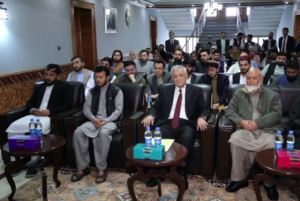 Yadgar Shadmanov, the ambassador of Uzbekistan, said that these historical figures have left a legacy in various sectors for today’s and future generations.
Yadgar Shadmanov, the ambassador of Uzbekistan, said that these historical figures have left a legacy in various sectors for today’s and future generations.
The Embassy of Uzbekistan in Kabul organized a cultural program in memory of Amir Timur Kurgan, Amir Ali-Shir Nava’i, and Zahiruddin Muhammad Babur in the capital.
Yadgar Shadmanov, the ambassador of Uzbekistan, said that these historical figures have left a legacy in various sectors for today’s and future generations.
Uzbekistan’s Ambassador to Kabul said: “These three figures, namely Amir Timur, Ali Shir Nava’i, and Zahiruddin Muhammad Babur, are known in the world of science and culture by everyone because they have left lasting legacies with their pen and creations, and also in the sector of governance.”
A number of cultural figures said the holding of such programs are a way to further recognize the impactful roles of historical figures.
“Holding such gatherings helps especially the Uzbeks living inside Afghanistan to become aware of their identity and culture, and it is very influential,” said Mahboobullah Toran, a cultural activist.
“From the works of our ancestors like Amir Ali Shir Nava’i and Amir Saheb Qur’an, each of them had brilliant records in their eras,” said Inamullah Frotan, another cultural activist.
In this program, a number of youth who had roles in cultural activities and also created literary works were honored by the Embassy of Uzbekistan.
National Volleyball Team Prepares for Central Asia Competition
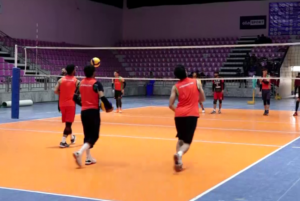 Coaches from the Volleyball Federation consider the training for the Central Asia competitions crucial for victory.
Coaches from the Volleyball Federation consider the training for the Central Asia competitions crucial for victory.
The national volleyball team’s training camp has started in the capital and for the past two weeks it has been running. The team plans to participate in the Central Asia competitions.
Officials from the National Volleyball Federation said that currently only players from Kabul are training in this camp, and after Eid al-Fitr, several national players from various provinces will also join the team.
According to officials, the national volleyball team is set to participate in the Central Asia competitions in Pakistan.
Mohammad Naser Noori, the Secretary-General of the Volleyball Federation, said: “Central Asia’s competitions are to be held differently, in which teams from Iran, India, Pakistan, Kyrgyzstan, Sri Lanka, and Afghanistan are participating, and it is expected that the number of countries will increase.”
The volleyball competitions in Central Asia, hosted by Pakistan, will start in May this year in the city of Lahore with more than five countries participating, including Afghanistan.
Coaches from the Volleyball Federation consider the training for the Central Asia competitions crucial for victory.
Mohammad Saber Noori, the head coach of the national volleyball team, said: “The training camp we have started, we are working on all aspects with the players to have a good result in the future.”
Tawab Ahmad Sharifi, the assistant coach, said: “The federation’s focus is on this training camp so that we can train new players together with our former players to send a well-organized team to the competitions in Pakistan.”
National volleyball players who are busy training in the capital during the holy month of Ramadan are optimistic about this training program aimed at full readiness for the Asian competitions in Pakistan.
Some of these athletes have also called for support from the government to expand their scope.
“Currently, as we train here, there are also new players present so that we can better prepare,” said Sabawoon Wardak, the captain of the national volleyball team.
“Our request to the government is to provide us with a specific gymnasium so that our team can train better,” said Muntazar Husain, a volleyball player.
The national volleyball team is preparing for the Central Asia competitions in Pakistan, following a performance that had previously led to their ascent in the world and Asian rankings.
Rashid Khan: Cricket Should Not Be Influenced By Government Policies
 He said that cricket is a “source of happiness” and should not be involved in government matters.
He said that cricket is a “source of happiness” and should not be involved in government matters.
Afghan cricketer Rashid Khan expressed his disappointment following the cancellation and postponement of matches with Afghanistan by the Australian Cricket Board.
He said that cricket is a “source of happiness” and should not be involved in government matters.
Rashid Khan said: “As a player you can’t do much about it,” he said. “It’s the issue of governments to resolve. But what hurts me the most is when things like that happens, why it is hurting cricket [in Afghanistan]?
In an interview with the sports newspaper ESPN Cricinfo, Rashid Khan expressed that such decisions are upsetting for him because the Afghanistan cricket team needs to play against major teams.
Khan added: “As a captain where you are so excited as a youngster playing against Australia and then this thing just happens.”
Speaking about his participation in matches in Australia, Rashid Khan mentioned that if Australia does not play against the Afghanistan cricket team, he does not want to undermine the value and status of his country and teammates.
Rashid Khan has been playing in the Australian Cricket Commercial League for several years.
The Australian Cricket Board, in response to restrictions on work and education for women in Afghanistan, has canceled one test match and three one-day matches and postponed three T20 matches with the Afghanistan national cricket team.
Afghanistan National Futsal Team Qualifies for World Cup for First Time
 The World Cup futsal tournament, including the Afghan team, will take place in Uzbekistan in 2024 with 26 teams.
The World Cup futsal tournament, including the Afghan team, will take place in Uzbekistan in 2024 with 26 teams.
The Afghanistan national futsal team qualified for the World Cup for the first time.
Afghanistan’s final playoff match for World Cup qualification was held today (April 28) against Kyrgyzstan in Thailand and the Afghans defeated their opponents 5-3, qualifying for the World Cup for the first time ever.
Amin Qanbari and Mehran Gholami were notable scorers in this historic victory.
In response to this achievement, both former Afghan President Hamid Karzai and Zabihullah Mujahid, the spokesperson for the Islamic Emirate, extended their congratulations to the team.
Karzai commended the national futsal team and all Afghan athletes, expressing his anticipation for continued success and accomplishments in the realm of sports.
The World Cup futsal tournament, including the Afghan team, will take place in Uzbekistan in 2024 with 26 teams.
Subscribe Now
Don’t miss our future updates! Get Subscribed Today!
© 2023 White Assembly. All Rights Reserved.
